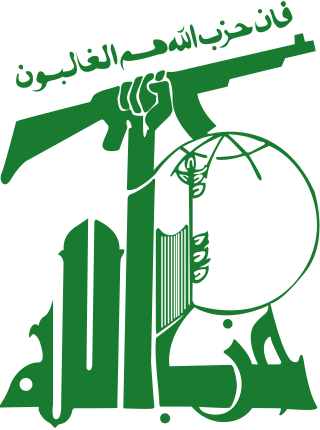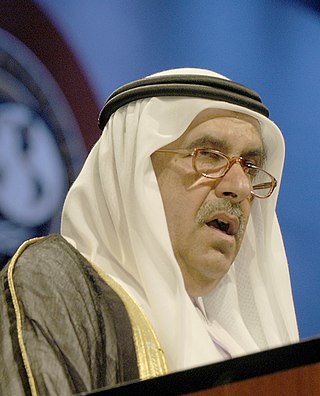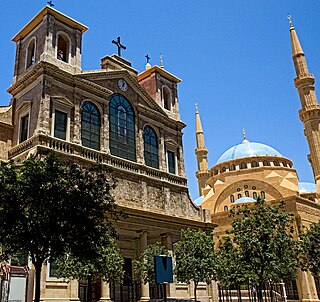Related Research Articles

Hezbollah is a Lebanese Shia Islamist political party and militant group, led since 1992 by its Secretary-General Hassan Nasrallah. Hezbollah's paramilitary wing is the Jihad Council, and its political wing is the Loyalty to the Resistance Bloc party in the Lebanese Parliament.

Lebanon, officially the Republic of Lebanon, is a country in West Asia. It is bordered by Syria to the north and east, by Israel to the south, and by the Mediterranean Sea to the west; Cyprus lies a short distance away from the country's coastline. Lebanon's location at the crossroads of the Mediterranean Basin and the Arabian hinterlands has contributed to the country's rich history and shaped a unique cultural identity denoted by religious diversity. Located in the Levant region of the Eastern Mediterranean, the country has a population of more than five million people and covers an area of 10,452 square kilometres (4,036 sq mi). Lebanon's capital and largest city is Beirut, followed by Tripoli and Jounieh. While Arabic is the official language, French is also recognized in a formal capacity; Lebanese Arabic is the country's vernacular, though French and English play a relatively significant role in everyday life, with Modern Standard Arabic being limited to news and government matters.

Beirut is the capital and largest city of Lebanon. As of 2014, Greater Beirut has a population of 2.5 million, which makes it the third-largest city in the Levant region and the thirteenth-largest in the Arab world. The city is situated on a peninsula at the midpoint of Lebanon's Mediterranean coast. Beirut has been inhabited for more than 5,000 years, making it one of the oldest cities in the world.

Terry A. Anderson is an American journalist. He reported for the Associated Press. In 1985, he was taken hostage by Shia Hezbollah militants of the Islamic Jihad Organization in Lebanon and held until 1991. In 2004, he ran unsuccessfully for the Ohio State Senate.

The culture of Lebanon and the Lebanese people emerged from various civilizations over thousands of years. It was home to the Phoenicians and was subsequently conquered and occupied by the Assyrians, the Greeks, the Romans, the Persians, the Arabs, the Crusaders, the Ottoman Turks and the French. This variety is reflected in Lebanon's diverse population, composed of different religious groups, and features in the country's festivals, literature, artifacts, cuisine and architecture of Lebanon. Tourism in Lebanon is popular with periods of interruption during conflict.
John Kent Cooley was an American journalist and author who specialized in islamist groups and the Middle East. Based in Athens, he worked as a radio and off-air television correspondent for ABC News and was a long-time contributing editor to the Christian Science Monitor.

Élias Sarkis was a Lebanese lawyer and President of Lebanon who served from 1976 to 1982.

Anthony Shadid was a foreign correspondent for The New York Times based in Baghdad and Beirut who won the Pulitzer Prize for International Reporting twice, in 2004 and 2010.
Walid Phares is a Lebanese-born American scholar and conservative political pundit.

Rashid Ismail Khalidi is a Palestinian-American historian of the Middle East and the Edward Said Professor of Modern Arab Studies at Columbia University. He served as editor of the Journal of Palestine Studies from 2002 until 2020, when he became co-editor with Sherene Seikaly.

Christianity in Lebanon has a long and continuous history. Biblical Scriptures purport that Peter and Paul evangelized the Phoenicians, whom they affiliated to the ancient Patriarchate of Antioch. Christianity spread slowly in Lebanon due to pagans who resisted conversion, but it ultimately spread throughout the country. Even after centuries of Muslim rule, it remains the dominant faith of the Mount Lebanon region and has substantial communities elsewhere. Even though christians are not the majority in Lebanon itself anymore, they still constitute the majority of the Lebanese people around the world, at nearly 80%.

Kai Bird is an American author and columnist, best known for his works on the atomic bombings of Hiroshima and Nagasaki, United States-Middle East political relations, and his biographies of political figures. He won a Pulitzer Prize for American Prometheus: The Triumph and Tragedy of J. Robert Oppenheimer.
Michel Kilo was a Syrian Christian writer and human rights activist, who has been called "one of Syria's leading opposition thinkers."

Sheikh Hamdan bin Rashid Al Maktoum was an Emirati politician, the deputy ruler of Dubai and the minister of finance and industry of the United Arab Emirates (UAE). He was the second son of the late ruler Rashid bin Saeed Al Maktoum. Hamdan bin Rashid Al Maktoum was the head of the UAE's delegation at the International Monetary Fund and the OPEC Fund.
The earliest written record of Dubai (Dibei) is accredited to Muhammad al-Idrisi, who mapped the coast of the UAE in the tenth century AD. Circa 1580, the state jeweler of Venice, Gasparo Balbi, documented the pearling industry of Dubai and other cities currently presiding in UAE territory. Though traditionally conservative, the UAE is one of the most liberal countries in the Gulf, with other cultures and beliefs generally tolerated. Politically it remains authoritarian, however, relations with neighbouring Iran have been tense because of an ongoing territorial dispute over Gulf islands. The UAE was one of only three countries to recognise Taliban rule in Afghanistan.

The cinema of Lebanon, according to film critic and historian Roy Armes, is the only other cinema in the Arabic-speaking region, beside Egypt's, that could amount to a national cinema. Cinema in Lebanon has been in existence since the 1920s, and the country has produced more than 500 films.

Lebanon is an eastern Mediterranean country that has the most religiously diverse society within the Middle East, comprising 18 recognized religious sects. The religions are Islam and Christianity. The Druze concern around an estimate of 5% of the citizens in Lebanon. Furthermore, outside of Lebanon, Lebanese people are mostly Christians. It is also estimated that a large proportion of its population are refugees, which affects statistics. The refugees, who mostly are of Syrian or Palestinian origin, are predominantly Sunni Muslim, but also include Christians and Shia Muslims.

According to the 2005 census, Christians accounted for 9 percent of the total population of the United Arab Emirates; estimates in 2010 suggested a figure of 12.6%.
Helena Cobban is a British-American writer and researcher on international relations, with special interests in the Middle East, the international system, and transitional justice. She is a non-resident Senior fellow at the Washington DC-based Center for International Policy. She is the founder and CEO of the book-publishing company, Just World Books and the Executive President of the small educational non-profit organization, Just World Educational. Having contributed throughout her career to numerous media outlets and authored seven books, she resumed her writing career in 2019.
Jim Muir is a British journalist, currently serving as a Middle East correspondent for BBC News, based in Beirut, Lebanon.
References
- ↑ "'Shadow Wars' exposes underlying patterns behind Middle Eastern strife", The Christian Science Monitor
- ↑ "Staff page" . Retrieved 24 May 2013.
- ↑ Davidson, Christopher. "Christopher Davidson". Article. Archived from the original on 8 January 2011. Retrieved 18 March 2011.
- ↑ Davidson, Christopher (10 March 2009). "Dubai 'Fraud': Where Are The Locals?". Forbes. Archived from the original on March 12, 2009. Retrieved 18 March 2011.
- ↑ Davidson, Christopher (27 November 2009). "What is Dubai and Who Runs It?". BBC. Retrieved 18 March 2011.
- ↑ "North-East man in Beirut flight drama". The Northern Echo. 10 May 2008. Retrieved 2017-03-29.